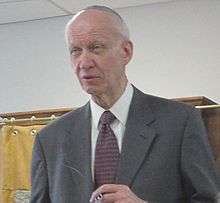Irving Greenberg
Irving (Yitzchak) Greenberg (born 1933), also known as Yitz Greenberg, is an American scholar, author and Orthodox rabbi.[1] He is known as a strong supporter of Israel,[2] and a promoter of greater understanding between Judaism and Christianity.[3]

Biography
Greenberg attended Yeshiva Beis Yosef, where he was ordained in 1953. At the same time he attended Brooklyn College, where he received a B.A. in history, summa cum laude; he earned a M.A. and PhD. in American history from Harvard University in 1960. He served as the Jewish chaplain of Brandeis University, the rabbi of the Riverdale Jewish Center, an associate professor of history at Yeshiva University, and as a founder, chairman, and professor in the department of Jewish studies of the City College of the City University of New York.[4] He is on the faculty of the Open Orthodox Yeshivat Chovevei Torah.[5] He has also served as the President of the National Jewish Center for Learning and Leadership. He is married to the Orthodox Jewish feminist writer Blu Greenberg.
In 2020, Greenberg joined the faculty of Yeshivat Hadar as the Senior Scholar in Residence.[6]
Thought
Greenberg's thought involves reading current Jewish history through use of traditional Jewish categories of thought. He has written extensively about the Holocaust and about the historical and religious significance of the State of Israel.
He learned Jewish thought from Rabbi Joseph B. Soloveitchik. He has taught extensively, and a number of well-known scholars, including Rabbi Joseph Telushkin and Michael Berenbaum, consider him their mentor.
Greenberg espouses the concept of "Tikkun Olam" (repairing the world) as humanity working, as co-creator with God, in improving the world. He sees the Jewish people's covenant with God as enjoining them to set an example for the moral edification of mankind. Another concept is his idea that the image of God in all humans implies that each person has "infinite value, equality, uniqueness".[7] According to Greenberg, that means that there is no absolute truth or correct religion: "Part of every truth is the fact that an image of God is speaking it; that is to say, a being of infinite value, equality, and uniqueness is speaking it."[8]
Only part of his post-Holocaust theology has been published.[9] Greenberg sees the Holocaust as a seminal event in Jewish history, which should be seen as the "breaking of the covenant" between God and the Jewish People. It is also latest stage in God's tzimtzum from the world. According to Greenberg, the Holocaust drives home the point that the fate of the world is in humanity's hands. If there can be such a strong evil in the world as manifest in the Holocaust, there can also be realized in the world the most incredible good.
Controversy
Greenberg's theological views have been harshly criticized by Orthodox rabbis Avrohom Gordimer and David Berger.[10][11]
In the 1980s, Greenberg was involved in a controversial debate with the late Rabbi Meir Kahane.[12][13]
Works
- Cloud of Smoke, Pillar of Fire: Judaism, Christianity, Modernity After the Holocaust (1976)
- The Third Great Cycle of Jewish History (1981)
- Voluntary Covenant (1982)
- The Jewish Way: Living the Holidays (1988)
- The Ethics of Jewish Power (1990)
- Judaism and Christianity: Their Respective Roles in the Divine Strategy of Redemption (1996)
- Covenantal Pluralism (1997)
- Living in the Image of God: Jewish Teachings to Perfect the World (1998)
- For the Sake of Heaven and Earth: The New Encounter Between Judaism and Christianity (2004)
- Sage Advice - Commentary on Pirkei Avot (2016)
References
- "Irving Greenberg". www.jewishvirtuallibrary.org. Retrieved 2020-07-02.
- "Arnold Jacob Wolf, "The Revisionism of Irving Greenberg"". Archived from the original on 7 February 2012. Retrieved 6 April 2018.
- Carroll James, "In Appreciation of Irving Greenberg" Archived 2008-11-19 at the Wayback Machine
- Beliefnet, "Rabbi Irving Greenberg: Beliefnet Columnist"
- Rabbi Irving (Yitz) Greenberg, yctorah.org/staff
- "J.J. Greenberg Institute for the Advancement of Jewish Life Will Join with Hadar". eJewish Philanthropy. 2020-07-06. Retrieved 2020-07-15.
- p. 387, "Seeking the Religious Roots of Pluralism: In the Image of God and Covenant" in Journal of Ecumenical Studies 34:3 (Summer 1997).
- p. 390, ibid.
- Wrestling with God, Oxford University Press 2007
- "The Last Thing We Need is a Degenerated and Compromised Orthodoxy: A Response to R. Yitz Greenberg - Cross-Currents". 5 May 2016. Retrieved 6 April 2018.
- http://traditionarchive.org/news/_pdfs/berger.pdf
- Kahane, Meir. "Debate - Rabbi Meir Kahane with Prof. Greenberg". YouTube.
- Greenberg, Irving (June 13, 2003). "(Orthodo)X-Men, On Screen and Off". Forward.
External links
| Wikiquote has quotations related to: Irving Greenberg |
- Rabbi Irving Greenberg - website
- Articles by Yitz Greenberg on the Berman Jewish Policy Archive @ NYU Wagner
- "Irving Greenberg and a Jewish Dialectic of Hope" by Michael Oppenheim, from Judaism: A Quarterly Journal of Jewish Life and Thought, Vol. 49, No. 2
- Lecture by Greenberg at Boston College